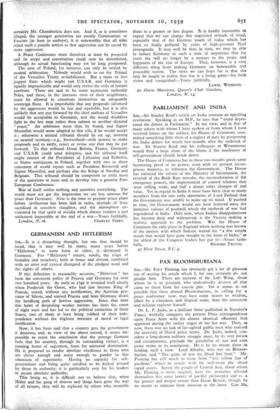GERMANISM AND HITLERISM SIR, — It is a disturbing thought, but one
that should be faced, that it may well be many, many years before "Hitlerism," in some form or other, is -destroyed in Germany. For " Hitlerism " means, surely, the reign of brutality and treachery, both at home and abroad, combined with an utter and cynical disregard of the pledged word and the rights of others.
If this definition is reasonably accurate, "Hitlerism " has been the consistent policy of Prussia and Germany for over two hundred years. As early as 1740 it revealed itself clearly when Frederick the Great, who had just become King of Prussia, seized, without any justification, the Austrian pro- vince of Silesia, and started Prussia and later Germany down the headlong path of lawless aggression. Since that time this habit of despoiling weaker nations has been the cause of eight wars and has led to the political extinction of three States, two of them at least being robbed of their inde- pendence without the slightest measure of moral or legal justification.
Now, it has been said that a country gets the government it deserves, and, in view of the above record, it seems im- possible to resist the conclusion that the average German feels that his country, through its outstanding virtues, is a teeming home of supermen, born for universal domination. He is prepared to render absolute obedience to those who are clever enough and noisy enough to pander to this obsession of superiority. Having no capacity for self- government and being quite satisfied to be kicked around by those in authority, it is particularly easy for his leaders to secure absolute authority.
This being so, it is difficult not to believe that, when Hitler and his gang of thieves and thugs have gone the way of all tyrants, they will be replaced by others who resemble them to a greater or less degree. It is hardly reasonable to expect that we can change this engrained attitude of mind, especially that of the German youth of today which has been so foully polluted by years of high-pressure Nazi propaganda. It may well be that, in time, we may be able to reduce Germany to such a state of impotence that for years she will no longer be a menace to the peace and happiness of the rest of Europe. That, however, is a very different thing from making Germany an honourable and peaceable nation. The most we can hope for is that she may be taught to realise that war is a losing game—for both victor and vanquished.—Yours faithfully, LEWIS WHARTON.
20 Owen Mansions, Queen's Club Gardens,
London, W.14.




































 Previous page
Previous page